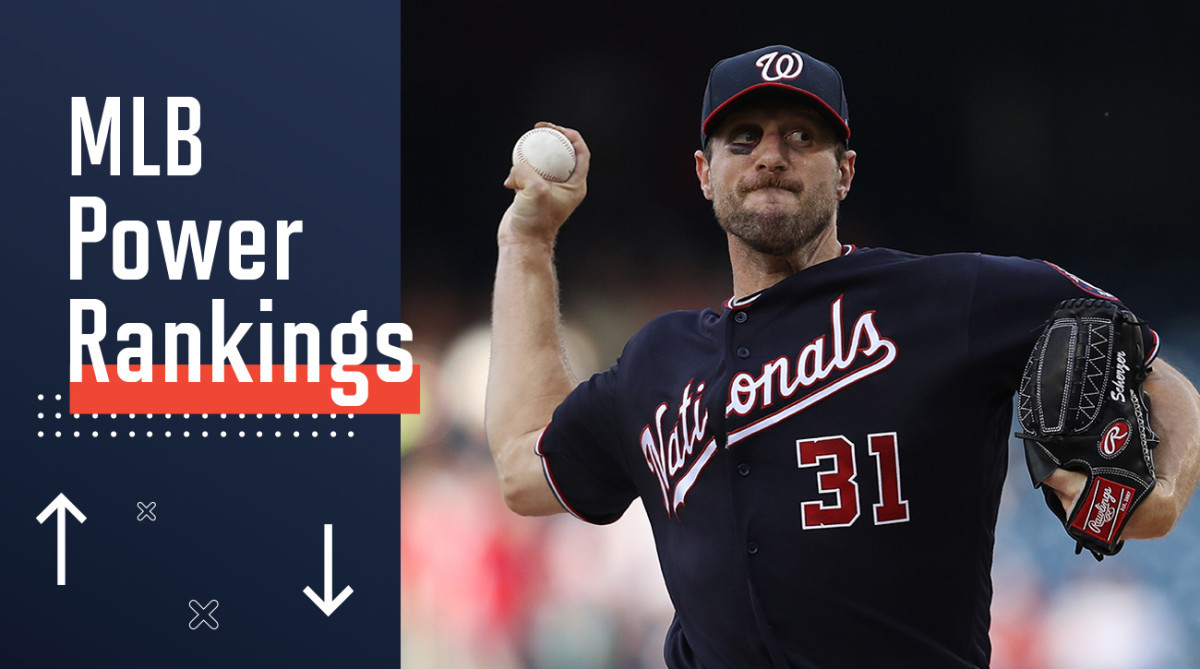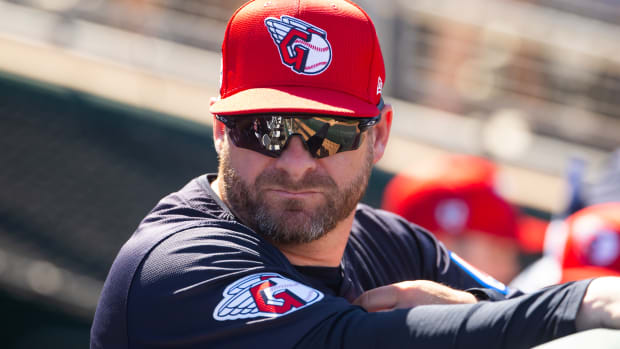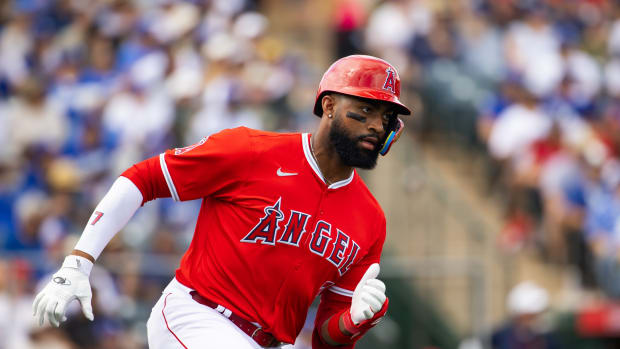MLB Power Rankings: Teams on the Brink of Crucial Trade Deadline Decisions

Hark, it is time for SI’s MLB Power Rankings. This week’s theme? Teams on the brink—those that are currently in the position of having to decide whether to buy or sell at the trade deadline. (For a look at the teams with some more clarity on what they’re doing, check out this handy deadline primer.) In our normal ranking, then, we shine the spotlight on the ten clubs who have the most to grapple with in this department. Catch up on last week’s ranking here, and read more about the format here. Onward!
30. Baltimore Orioles (21-54; Last Week: 30)
29. Detroit Tigers (26-44; Last Week: 26)
28. Toronto Blue Jays (27-48; Last Week: 29)
27. San Francisco Giants (31-42; Last Week: 25)
26. Miami Marlins (27-46; Last Week: 27)
25. Kansas City Royals (26-49; Last Week: 28)
24. Pittsburgh Pirates (33-40; Last Week: 23)
23. Seattle Mariners (33-46; Last Week: 24)
22. Chicago White Sox (35-37; Last Week: 22)
The White Sox have not been above .500 in 2019, which you might think would largely eliminate them from this kind of decision, but they’ve frequently been within just a game or two of the mark—which is better than originally expected, and certainly better than the team has been heading into the deadline in recent years. For Chicago’s rebuild, construction is not yet complete, but the progress is evident. Eloy Jiménez is here! Lucas Giolito is who you thought he was! Yoán Moncada has bounced back!
This year might not mean much, but 2020 should. That means the White Sox won’t be engaging in their recent tradition of selling off as much as they reasonably can—so how much will they sell, if at all? “We are going to have guys who other teams want,” GM Rick Hahn told reporters last week. “...When you are talking about guys who could potentially play a role on the 2020 White Sox, a year we expect to take yet another step forward in the process and start being in the mix for playing in October, the calculus becomes a little more heavily weighted in terms of keeping a guy.” The most interesting one to watch here? Closer Alex Colomé, who’s under team control through 2020. The 30-year-old is having a standout season and could yield a solid return at the deadline, but without too much else in the ‘pen, Chicago just might opt to have him stay put—a move that, more than the team’s win total, would indicate that it’s really into the next stage of this rebuild.
21. New York Mets (35-40; Last Week: 18)
The Mets fired their pitching coach and bullpen coach on Thursday, which would seem to indicate that they’re interested in trying to make a push to save their season… save for the fact that the problem here would seem to be the pitching staff itself, more so than the coaches (please avert your eyes from the ‘pen for your own safety), particularly when the replacements are this head-scratching. 82-year-old Phil Regan—a former teammate of Sandy Koufax, if you’d like some context on just how old that really is—will be the new pitching coach, and the relievers will be in the hands of Ricky Bones. You know, Ricky Bones, who was the team’s bullpen coach from 2012 to 2018, before getting sent down to High-A.
The Mets are five games out of a wild-card spot, which isn’t great, but it certainly isn’t insurmountable. But, uh, we’re not sure exactly what they’re doing here. Which feels par for the course in Queens.
20. Los Angeles Angels (38-38; Last Week: 20)
The Angels made a good-faith effort to bolster their pitching staff for this season. They just had the misfortune to watch the explosion of almost every single one of their additions (Matt Harvey, Cody Allen, Trevor Cahill). Still, there’s reason to believe that they could make something happen here, with just a little added effort and good fortune. With a 108 OPS+, the offense is the sixth-best in baseball. Mike Trout is here and capable of as many otherworldly feats as ever. It shouldn’t feel especially crazy to dream of a wild-card berth… and, yet, with the team’s operational track record and pitching staff, it kind of does.
19. Cincinnati Reds (35-38; Last Week: 21)
Remember January, when it seemed like this team was making a push to contend? The Reds certainly haven’t met those expectations with their record—the only time they’ve been over .500 was March 28, when they were 1-0—but, in a sense, they have with their actual performance. The Reds have a +47 run differential, tied for third best in the National League. If they’d been just a little luckier in the sequence and distribution of those runs, this season would have looked markedly different. By Pythagorean record, Cincinnati should be 42-31, rather than 35-38; FanGraphs’ BaseRuns adjusted record says 40-33. The Reds’ situation has been improving lately, however, with a winning streak of five games and counting. There’s still a ways to go, but if the real record starts to catch up to the hypothetical one, Cincinnati will have a tough call to make.
18. San Diego Padres (38-37; Last Week: 16)
17. Washington Nationals (36-38; Last Week: 19)
The reports of the Nationals’ death are greatly exaggerated. On a 12-5 run, Washington has jolted back to life in the last two weeks (with its position in the division boosted by a rough stretch of performance from second-place Philadelphia). The Nationals, in other words, no longer look like they’ll be selling. It just remains to be seen if this means they’ll actually be buying (GM Mike Rizzo is traditionally optimistic in these spots, after all), or just hanging tight for next year.
16. Cleveland Indians (39-35; Last Week: 17)
Nothing about Cleveland’s season has gone according to plan, although, to be fair, it seemingly didn’t have much of a plan to begin with. (“1. Show Up. 2. Win Division Again” doesn’t count.) The team didn’t anticipate beginning the year with the worst offense in baseball; it didn’t anticipate a series of pitching injuries; it didn’t anticipate the continued collapse of José Ramírez; it certainly didn’t anticipate the sudden rise of Minnesota.
After all of this, Cleveland is left fighting for a wild-card berth… but if the team faces any additional struggle in the lead-up to the deadline, it might not even be doing that. While selling doesn’t currently seem like the default, it’s certainly not off the table yet.
15. Arizona Diamondbacks (38-38; Last Week: 13)
The Diamondbacks, like the Reds, should have a better record than they actually do. (Pythagorean: 43-33, which, well, there’s no beating the Dodgers in the NL West, but it would certainly put them in a considerably more comfortable spot for a wild-card spot.) Given that they started selling this winter, it doesn’t seem like they’re in a logical position to reverse course this summer… but they’re close enough to make it a judgment call, and their performance in the next few weeks will likely be the decider.
14. St. Louis Cardinals (38-36; Last Week: 15)
This winter, St. Louis looked poised to make a potentially serious run, particularly with the acquisition of Paul Goldschmidt… but they’ve faced some serious underperformance, especially with the rotation, and now they’re floating in a no man’s land, where a hard sell and a shopping spree look equally impractical.
13. Philadelphia Phillies (39-35; Last Week: 9)
12. Texas Rangers (40-35; Last Week: 11)
The Rangers just might be baseball’s most delightful surprise of the season. After a fourth-place finish in 2017 and a last-place finish in 2018, a recent burst has them hanging in second for the entirety of June 2019. This means the Rangers who had previously looked like surefire trade candidates (ahem, Mike Minor) might now be the keys to Texas’ own run… or the club might decide that it’s been lucky to get the performances it has from its crew of veterans so far, and deal them now, while they have maximum trade value, to gear up for the future.
11. Oakland Athletics (40-36; Last Week: 12)
Over the four and a half weeks, Oakland has gone 21-11, reversing the course of what looked like it might have otherwise been a disappointing season. But it’s unlikely that it can earn a second consecutive wild-card berth with the roster as it is, and so it will likely have to make some additions—particularly to its pitching staff—if it seriously wants to contend. With Texas’ unanticipated success crowding the picture, however, Oakland will have to decide if it’s worth it to try.



































